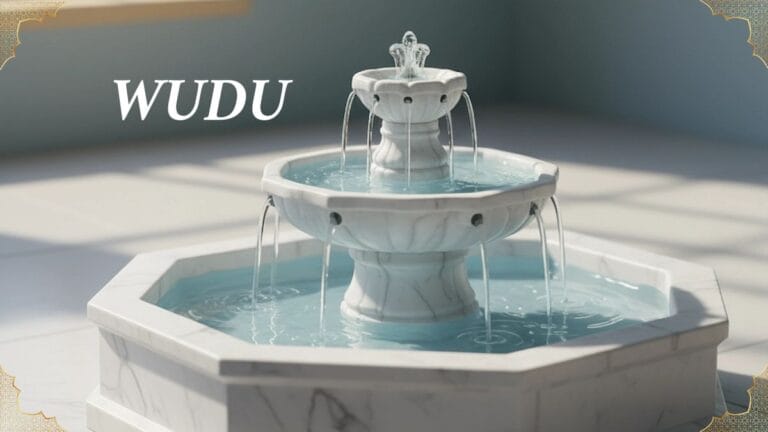In Islam, Ghusl (غُسل) means ritual purification of the entire body using clean water.
It is not only an act of physical cleanliness but also a spiritual purification that restores a Muslim’s state of purity (tahārah), required for performing Salah (prayer), reciting Qur’an, or entering a mosque.
Allah (ﷻ) commands in the Qur’an:
“And if you are in a state of janābah (major impurity), then purify yourselves.”
(Surah Al-Mā’idah, 5:6)
This verse clearly shows that Ghusl is fard (obligatory) in certain conditions.
See Also: Adhan in Arabic, English
When Ghusl Becomes Obligatory

Ghusl is compulsory (farḍ) in the following cases:
- After Janābah – When semen is discharged (during sleep or intimacy).
- After Sexual Intercourse – Even if there is no discharge.
- After Menstruation (Ḥayḍ) – When a woman’s monthly cycle ends.
- After Post-natal Bleeding (Nifās) – When bleeding after childbirth stops.
- When a Non-Muslim Accepts Islam – The Prophet (ﷺ) recommended new Muslims to perform ghusl.
- Before Burial – Every deceased Muslim must be given ghusl before janāzah prayer.
Sunnah Ghusl (Recommended Ghusl)
It is Sunnah (highly recommended) to perform Ghusl:
- Before Friday (Jumuʿah) prayer
- Before Eid al-Fitr and Eid al-Adha prayers
- Before entering Ihrām for Hajj or ʿUmrah
- After washing a deceased person
- After recovering from insanity or unconsciousness
Preparing for Ghusl
Before starting, ensure:
- Water is clean and pure (tāhir).
- You are in a private area (maintaining modesty).
- Remove any items (rings, watches, etc.) that may prevent water from reaching the skin.
- Keep a bucket, jug, or shower ready for proper washing.
Step-by-Step Method of Ghusl (According to the Sunnah)
This method is based on authentic Hadith from Sahih al-Bukhari (Hadith 248) and Sahih Muslim (Hadith 316) describing how the Prophet (ﷺ)performed Ghusl.
Make Niyyah (Intention)
Make the intention in your heart that you are performing Ghusl to purify yourself for the sake of Allah.
- You don’t have to say it aloud.
- Example:
“I intend to perform Ghusl to remove impurity and become pure for worship.”
Note:
Without niyyah, the ghusl is not valid because actions are judged by intentions (Sahih Bukhari, Hadith 1).
Say “Bismillah”
Before beginning, say بِسْمِ اللهِ (Bismillah) — In the name of Allah.
It brings barakah and follows the Sunnah.
Wash Both Hands (Three Times)
Wash both hands up to the wrists three times to ensure cleanliness.
- This prepares you for handling water and cleaning other body parts.
Clean the Private Parts and Any Impurity
- Use the left hand to wash private parts thoroughly.
- Remove any dirt, discharge, or impurity (najāsah) from the body.
- If any impurity is on the clothes, remove or wash that area too.
Tip:
Avoid touching private parts with the right hand — the Prophet (ﷺ) forbade using it for cleaning impurity.
Perform Complete Wudu (Ablution)
Perform Wudu as done before Salah.
This includes:
- Washing hands up to the wrists
- Rinsing the mouth three times (madmadah)
- Cleaning the nose by sniffing water (istinshāq)
- Washing the face completely
- Washing arms up to the elbows
- Performing Masah (wiping over the head)
- Washing feet up to the ankles
Note:
You can delay washing the feet till the end of Ghusl if you are standing in dirty or flowing water.
See Also: How to do Tayammum
Pour Water Over the Head Three Times
Pour water three times on your head, ensuring it reaches the roots of the hair and scalp.
- Men should run fingers through the beard and hair.
- Women should not undo their braids if water can reach the scalp (Sahih Muslim 330).
Wash the Right Side of the Body
Pour water on your right shoulder and side three times while rubbing with your hands.
Wash the Left Side of the Body
Do the same on your left shoulder and side three times.
Make sure water flows everywhere.
Wash the Entire Body Completely
Now wash the entire body thoroughly so no area remains dry.
Pay attention to:
- Behind the ears
- Armpits
- Under the knees
- Between fingers and toes
- The back and nape of the neck
💧 Rub your body lightly with your hands to ensure complete coverage.
Step Away and Wash Feet (if not done earlier)
If you delayed washing the feet during wudu, now wash them properly — first the right, then the left.
See Also: The 3 Farz in Ghusl
Important Sunnah Etiquettes During Ghusl
- Keep your ʿawrah (private parts) covered when possible.
- Face away from Qiblah while bathing.
- Do not speak unnecessarily during ghusl.
- Use water moderately — avoid wastefulness.
- After ghusl, dry yourself with a clean towel.
- It is permissible to use soap or shampoo — it doesn’t affect the validity of ghusl.
Conditions for Ghusl to Be Valid
Ghusl is only valid when:
- Water covers the entire body.
- No barrier (like thick paint, wax, or cream) prevents water from reaching the skin.
- There is a valid intention (niyyah).
- The water is pure (ṭāhir) and lawful to use.
Virtue and Purpose of Ghusl
Ghusl cleanses both body and soul.
The Prophet (ﷺ) said:
“Cleanliness is half of faith.”
(Sahih Muslim, Hadith 223)
It symbolizes renewal, obedience, and preparation to stand before Allah in a pure state.
Performing ghusl regularly – especially before Jumuʿah and Eid – brings spiritual freshness and blessings.
See Also: How to Make Wudu Step by Step
Difference Between Ghusl al-Janābah and Ghusl al-Jumuʿah
| Type of Ghusl | When It’s Done | Ruling |
|---|---|---|
| Ghusl al-Janābah | After impurity (sexual discharge, menstruation, etc.) | Fard (obligatory) |
| Ghusl al-Jumuʿah | Before Friday prayer | Sunnah (recommended) |
After Completing Ghusl
After finishing ghusl:
- You are now in a state of purity (tahārah).
- You can perform Salah, touch the Qur’an, fast, or enter the masjid.
- Say “Alhamdulillah” as gratitude for being purified.
Hadith References
- Sahih al-Bukhari, Hadith 248 — Description of how the Prophet (ﷺ) performed ghusl.
- Sahih Muslim, Hadith 316 — Method of washing head and body.
- Jamiʿ at-Tirmidhi, Hadith 106 — On ghusl for janabah.
- Sahih Muslim, Hadith 223 — “Cleanliness is half of faith.”
- Surah al-Ma’idah, Ayah 6 — Qur’anic command for purification.



